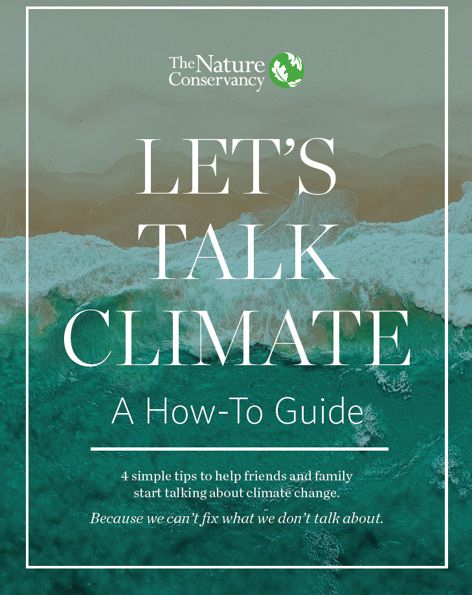Can We Talk Climate?
We get it. Talking about climate change can be tough. And sometimes, it’s downright awkward.
Start Talking
Even though more than 7 in 10 Americans believe climate change is happening, and 6 in 10 are worried about it, two-thirds of Americans rarely, if ever, talk about climate change with the people they care about.
We want to change that. The most recent reports on the current and forecasted impacts of climate change are clear—we are running out of time. Silence is no longer an option—and it could be doing more damage than you think.
Research shows there are typically four reasons people don’t want to talk about climate change:
- I don’t know enough.
- I don’t want to talk about scary things.
- I don’t think I can make a difference.
- I don’t want to cause an argument.
While these are certainly legitimate concerns, we’re here to help you navigate them. We’ve created an e-book that provides tips on having a connected conversation—one with active listening where the goal is sharing honest experiences about climate change.
TNC’s Chief Scientist and Atmospheric Science Professor Katharine Hayhoe notes in her TED Talk that the number one thing we can do to break the divisive rhetoric around climate change is “do the exact thing we’re not doing: talk about it.”
Speak Up for Nature
Talking about climate change can be tough. We’ve got tips to make it easier.
Get Our E-bookThe more people hear conversations about climate change, the more socially validated these conversations become. That’s a big deal.
Research shows that people tend to believe what they think those around them believe. So we need to signal to our friends and neighbors that climate is not only on our minds, it’s a priority. And once they see that climate change is important enough for you to talk about, it’s easier for them to talk to others about it, too.
Be Part of the Solution
We can’t solve a problem we don’t talk about. We’ve collected some of the best, proven information to make talking about climate change easier. You don’t have to have an argument or win a debate to make a difference. Simply having the conversation is the most important thing you can do.
Don’t wait to download your free Let’s Talk Climate How-To Guide today and take a step to help change the course of our planet.
Need more nature in your inbox?
Get global conservation stories, news and local opportunities near you. Check out a sample Nature News email.


